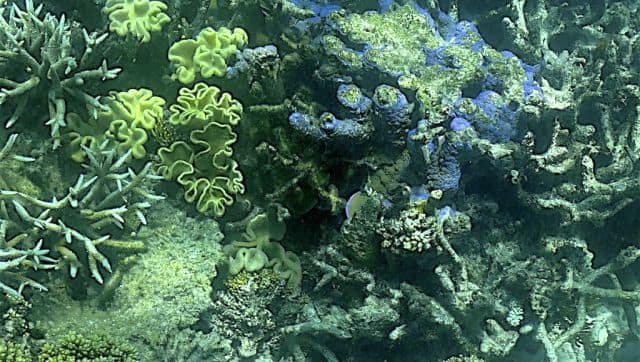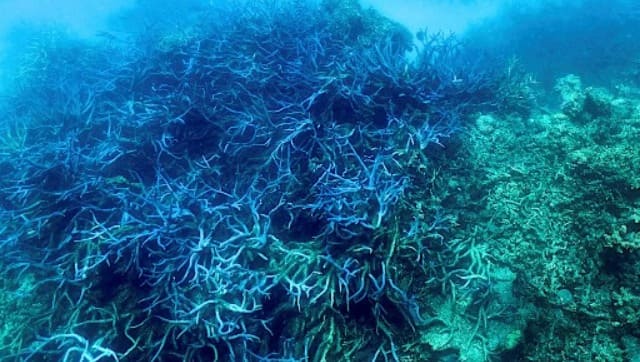The United Nations this week released a report recommending that the Great Barrier Reef be placed on the endangered list. The report came after a 10-day mission in March to the world famous reef off the coast of Australia. Let’s take a closer look at the reef and its status: What is it? The Great Barrier Reef, a UNESCO World Heritage site located off the coast of Queensland, Australia, is the world’s largest reef ecosystem. Thousands of species call the Reef home, according to Australia’s Great Barrier Reef Marine Park Authority (GBRMPA). The Great Barrier Reef accounts for around 10 per cent of the world’s coral reef ecosystems. The network of more than 3,000 reefs covers 348,000 square kilometers and 600 islands. What did the report find? Officials from the UN cultural agency and the International Union for Conservation of Nature on Monday warned that without “ambitious, rapid and sustained” climate action, the world’s largest coral reef is in peril. “The mission team concludes that the property is faced with major threats that could have deleterious effects on its inherent characteristics, and therefore meets the criteria for inscription on the list of World Heritage in danger,” the report said, as per CNN. In short, the US is demanding Australia improve four key areas:
- Look after land and water
- Phase out gillnets
- More effective disposal of dredge spoil
- Tackle climate change
What’s the current status? The reef is currently not in the endangered list.
But that doesn’t mean things are fine.
In May, Australian government scientists reported that more than 90 per cent of Great Barrier Reef coral surveyed in the latest year was bleached – the fourth such mass event in seven years. Bleaching is caused by global warming, but this is the reef’s first bleaching event during a La Niña weather pattern, which is associated with cooler Pacific Ocean temperatures, the Great Barrier Reef Marine Authority said in its annual report. Bleaching in 2016, 2017 and 2020 damaged two-thirds of the coral. Coral bleaches as a response to heat stress and scientists hope most of the coral will recover from the latest event. The Conversation quoted Professor Ove Hoegh-Guldberg as saying, “The reef is in dire trouble, but it’s decades away before it’s no longer worth visiting. That’s the truth. But unless we wake up and deal with climate change sincerely and deeply then we really will have a Great Barrier Reef not worth visiting. This isn’t even the first time the United Nations has made such a proposal – it did so in 2012, 2013, 2014 and 2017. What does the Australian government say? The Australian government, like previous regimes, is against any such move. [caption id=“attachment_10699001” align=“alignnone” width=“640”] The Great Barrier Reef has again been hit with “widespread” bleaching. AFP[/caption] Australia’s environment minister said Tuesday her government will lobby against UNESCO adding the Great Barrier Reef to a list of endangered World Heritage sites, arguing that criticisms of government inaction on climate change were outdated. Environment Minister Tanya Plibersek said the report was a reflection on Australia’s previous conservative government, which was voted out of office in May elections after nine years in power. She said the new center-left Labor Party government has already addressed several of the report’s concerns, including action on climate change. “We’ll very clearly make the point to UNESCO that there is no need to single the Great Barrier Reef out in this way” with an endangered listing, Plibersek told reporters. “The reason that UNESCO in the past has singled out a place as at risk is because they wanted to see greater government investment or greater government action and, since the change of government, both of those things have happened,” she added. The new government has legislated to commit Australia to reducing its greenhouse gas emissions by 43 per cent below the 2005 level by 2030. The previous government only committed to a reduction of 26 per cent to 28 per cent by the end of the decade. Plibersek said her government has also committed 1.2 billion Australian dollars ($798 million) to caring for the reef and has cancelled the previous government’s plans to build two major dams in Queensland state that would have affected the reef’s water quality.
The Great Barrier Reef has again been hit with “widespread” bleaching. AFP[/caption] Australia’s environment minister said Tuesday her government will lobby against UNESCO adding the Great Barrier Reef to a list of endangered World Heritage sites, arguing that criticisms of government inaction on climate change were outdated. Environment Minister Tanya Plibersek said the report was a reflection on Australia’s previous conservative government, which was voted out of office in May elections after nine years in power. She said the new center-left Labor Party government has already addressed several of the report’s concerns, including action on climate change. “We’ll very clearly make the point to UNESCO that there is no need to single the Great Barrier Reef out in this way” with an endangered listing, Plibersek told reporters. “The reason that UNESCO in the past has singled out a place as at risk is because they wanted to see greater government investment or greater government action and, since the change of government, both of those things have happened,” she added. The new government has legislated to commit Australia to reducing its greenhouse gas emissions by 43 per cent below the 2005 level by 2030. The previous government only committed to a reduction of 26 per cent to 28 per cent by the end of the decade. Plibersek said her government has also committed 1.2 billion Australian dollars ($798 million) to caring for the reef and has cancelled the previous government’s plans to build two major dams in Queensland state that would have affected the reef’s water quality.
“If the Great Barrier Reef is in danger, then every coral reef in the world is in danger,” Plibersek said.
“If this World Heritage site is in danger, then most World Heritage sites around the world are in danger from climate change.” The report said Australia’s federal government and Queensland authorities should adopt more ambitious emission reduction targets in line with international efforts to limit future warming to 1.5 degrees Celsius (2.7 degrees Fahrenheit) since pre-industrial times. The minor Greens party, which wants Australia to slash its emissions by 75 per cent by the end of the decade, called for the government to do more to fight climate change in light of the report. Jodie Rummer, a marine biologist at James Cook University in Townville who has worked on the reef for more than a decade, supported calls for Australia to aim for a 75 per cent emissions reduction. “We are taking action, but that action needs to be much more rapid and much more urgent,” Rummer told Australian Broadcasting Corp. “We cannot claim to be doing all we can for the reef at this point. We aren’t. We need to be sending that message to the rest of the world that we are doing everything that we possibly can for the reef and that means we need to take urgent action on emissions immediately,” she added. [caption id=“attachment_10659371” align=“alignnone” width=“640”] This picture taken on March 7, 2022 shows the current condition of the coral on the Great Barrier Reef, off the coast of the Australian state of Queensland. AFP[/caption] Feedback from Australian officials, both at the federal and state level, will be reviewed before Paris-based UNESCO makes any official proposal to the World Heritage committee next year. In July last year, the previous Australian government garnered enough international support to defer an attempt by UNESCO to downgrade the reef’s status to “in danger” because of damage caused by climate change. Rumours of its death… But wait. Wasn’t the Great Barrier Reef declared dead in 2019?
This picture taken on March 7, 2022 shows the current condition of the coral on the Great Barrier Reef, off the coast of the Australian state of Queensland. AFP[/caption] Feedback from Australian officials, both at the federal and state level, will be reviewed before Paris-based UNESCO makes any official proposal to the World Heritage committee next year. In July last year, the previous Australian government garnered enough international support to defer an attempt by UNESCO to downgrade the reef’s status to “in danger” because of damage caused by climate change. Rumours of its death… But wait. Wasn’t the Great Barrier Reef declared dead in 2019?
To quote a former US president, that’s fake news.
While multiple Sinhala-language Facebook and Twitter posts published in September 2019 shared an image of a diver swimming above bleached coral alongside claims that the Great Barrier Reef was “officially announced dead today” by scientists, that claim was false. Australian authorities in 2019 told AFP that the Great Barrier Reef “is certainly not dead” but is under threat due to climate change and other man-made problems. With inputs from agencies Read all the Latest News , Trending News , Cricket News , Bollywood News , India News and Entertainment News here. Follow us on Facebook , Twitter and Instagram .
)